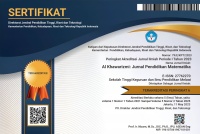MATHEMATICAL HABIT OF MIND DALAM PEMECAHAN MASALAH DIKAJI DARI BERPIKIR LUWES PESERTA DIDIK SMP
DOI:
https://doi.org/10.46368/kjpm.v2i1.612Abstract
Abstract: This study aimed to determine the Mathematical Habits of Mind of students in solving story problems in terms of the way of thinking of students in class IX of SMP Negeri 16 Pontianak. The form of research used in this study is a survey. Sources of data used in this study were seven students of class IX SMP Negeri 16 Pontianak. The data obtained in this study was a pre-research test to determine student ability level, flexible thinking test questions in the form of story questions, and interviews. The potential for flexible thinking is seen based on the mathematical abilities of students who have different levels. However, based on the study results, it can be seen that the class IX students of SMP Negeri 16 Pontianak have the potential for thinking that changes the potential perspective of 32.1%; potential considering options 7.1%; potential to produce alternatives 17.8%.
Keyword: Mathematical Habits of Mind, Flexible Thinking, Problem Solving.
Â
Â
Abstrak: Penelitian ini bertujuan untuk mengetahui kebiasan berpikir matematika peserta didik dalam menyelesaikan cerita yang ditinjau dari cara berpikir peserta didik kelas IX SMP Negeri 16 Pontianak. Bentuk penelitian yang digunakan dalam penelitian ini adalah survei. Sumber data yang digunakan dalam penelitian ini adalah tujuh peserta didik kelas IX SMP Negeri 16 Pontianak. Data yang diperoleh dalam penelitian ini adalah tes pra penelitian untuk mengetahui tingkat kemampuan peserta didik, soal tes luwes berupa cerita dan wawancara. Potensi luwes dilihat berdasarkan kemampuan matematis siswa yang memiliki tingkat yang berbeda-beda. Namun berdasarkan hasil belajar dapat diketahui bahwa peserta didik kelas IX SMP Negeri 16 Pontianak memiliki potensi berpikir yang mengubah potensi sebesar 32,1%; potensi mempertimbangkan opsi 7,1%; potensi untuk menghasilkan alternatif 17,8%.
Kata Kunci: Mathematical Habits of Mind, Berpikir Luwes, Pemecahan Â
                     Masalah.
References
Alacaci, C. M. (2010). Solving A Stability Problem by Polya‟s Four Steps. International Journal of Electronics, Mechanical, and Mechatronics Engineering, I(1), 19-28.
Andriani, S., Yulianti, K., Ferdias, P., & Fathonah, S. (2017). The effect of mathematical habits of mind learning strategy based on problem toward students‟ mathematical creative thinking disposition, III(9), 689-696.
Arikunto, Suharsimi. 2010. Prosedur Penelitian Suatu Pendekatan Praktik. Jakarta: Rineka Cipta.
Costa, A. L (2001). Developing Minds A Resource Book For Teaching Thinking. 3rd Edition. Association For Supervision And Curriculum Development Alexandria, Virginia. 1703 N. Beauregard St. Alexandria
Costa, AL., & Kallick, B., Translator by Brian Reza Daffi (2012) Belajar dan Mamimpin dengan „Kebiasaan Pikiran‟: 16 Karakteristik Penting untuk Sukses. Jakarta: Index
Costa, AL., & Kallick, B., (2008) Leading and Learning with Habits of Mind 16 Essential Characteristic for Success, (United States of America: Association for Supervision and Curriculum Development)
Cockcroft, W.H. (1982). Mathematics Counts: Report of the Committee of Inquiry into the Teaching of Mathematics in Schools under the Chairmanship of Dr WH Cockcroft. London: Her Majesty‟s Stationery Office
Lubart, T. I. (2010). Models of the Creative Process? : Past, Present and Future. Creativity Research Journal. 13 May 2013, 37-41.
NCTM. 2000. Principles and Standards for School Mathematics. Reston: NCTM.
Permendikbud, (2014), Peraturan Menteri Pendidikan dan Kebudayaan Republik Indonesia Nomor 59 Tahun 2014 Tentang Kurikulum 2013 Sekolah Menengah Atas/ Madrasah Aliyah. Jakarta: Departemen Pendidikan dan Kebudayaan.
Prabawanto, Sufyani. 2011. Pengembangan Instrumen Tes Pemecahan Masalah Matematis Siswa Sekolah Menengah Pertama. Paper. UPI Bandung. Tidak diterbitkan.
Rohaeti, E.E. (2008). Hard Skills dan Soft Skills Matematis Siswa. Bandung: Refika Aditama
Sitorus, J., & Masrayati. (2016). Students‟ Creative Thinking Process stages: implementation of realistic mathematics education. Thinking Skills and Creativity, 1-14.
Sugiyono. (2011). Metode Penelitian Pendidikan Pendekatan Kuantitatif, Kualitatif, R&D. bandung: Alfabeta
Polya. (1985) Pengertian Pemecahan Masalah. [Online]. Tersedia: http://yukberhitung.weebly.com/materi/pengertian-pemecahan-masalah matematika. [Diunduh 11 Agustus 2016].
Zuliyanti. (2017). Potensi berpikir kreatif sisw dalam menyeleesaikan soal cerita materi segitiga di sekolah menengah pertama boedi oetomo. Pontianak: FKIP UNTAN.
Downloads
Published
How to Cite
Issue
Section
Citation Check
License
Authors who publish with this journal agree to the following terms:
1. Authors retain copyright and grant the journal right of first publication with the work simultaneously licensed under a Creative Commons Attribution License that allows others to share the work with an acknowledgement of the work's authorship and initial publication in this journal.
2. Authors are able to enter into separate, additional contractual arrangements for the non-exclusive distribution of the journal's published version of the work (e.g., post it to an institutional repository or publish it in a book), with an acknowledgement of its initial publication in this journal.
3. Authors are permitted and encouraged to post their work online (e.g., in institutional repositories or on their website) prior to and during the submission process, as it can lead to productive exchanges, as well as earlier and greater citation of published work.






